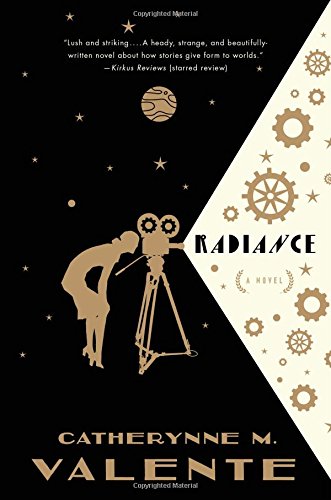
![]() Radiance by Catherynne M. Valente
Radiance by Catherynne M. Valente
Radiance, by Catherynne M. Valente, tells the story of documentary filmmaker Severin Unck and her ill-fated film project on Venus in the 1920’s. In this alternate history, humans conquered the solar system around the end of the 19th century, and human colonies have sprung up from Mercury to Pluto and everywhere in between. These are not the planets as we know them, though — inhospitable balls of gas, icy rocks, or boiling oceans. Valente is writing in the tradition of Burroughs and Weinbaum; these are the planets of sci-fi’s pulp age, teeming with exotic life, seemingly just waiting for human visitors to make sense of them, to build cities of chrome and glass. In such a solar system the golden age of Hollywood, with its glimmering silent film stars, occurs not on Earth but on the Moon.
Film and celebrity are major themes of Radiance. Severin Unck is the daughter of famous silent film director Percival Unck. She’s grown up in front of the camera, surrounded by the unrealities of film: haunted castles, improbable characters, and unlikely stories. As such, she decides to become a filmmaker of the real, to turn her natural genius for film towards life as it actually exists. Rebelling against the path of her father, she makes documentaries. And it is on her last project that Severin goes missing, creating a film exploring the mysterious link between a vanished city and callow whales.
What’s a callow whale, you ask, and well you might. It’s a … well, it’s sort of … um … Imagine a whale the size of an island, covered in animate kelp, docilely floating in the Venusian sea. Radiance doesn’t set out to tell the story of the callow whales, but their existence undergirds the entire narrative because they are the source for callowmilk, a substance that humans harvest in enormous quantities. Callowmilk performs dozens of functions, including making space travel and life in space possible. But humans don’t really understand the creatures whose resource pervades almost every aspect of their lives, and this fundamental misunderstanding has tragic consequences. The human colonization of the solar system turns out to be a cheery futuristic utopia built on death and suffering swept under the rug.
But we don’t ever get a straightforward story of Severin, or of the callow whales, because Radiance only tells the story of what might-have-happened on Venus. Valente shares this with us via a series of documents: news articles, journal entries, and transcribed conversations. A bulk of the narrative comes through screenplay treatments for a movie that Percival Unck intends to make about his missing-presumed-dead daughter. But he keeps changing his genre: it starts as a gritty noir, turns into a Gothic horror, and then becomes a closed-room murder mystery. Each treatment picks up where the other left off, but they seem to be telling slightly different stories.
This approach is genius, though, for revealing the way one death impacts a host of other characters. We only see Severin on film and through the memories of others. But this way we hear what she meant to her father, her stepmother, her lover, and the child she saved on Venus. These shifting, contradictory impressions build a well-rounded but slippery character — which is perfect, because Severin seems to be as much an enigma as the callow whales. The message I took from this is that complete understanding of any person is as impossible as complete understanding of an ecosystem. Just as the callow whales have invisible but far-reaching influence, a single human life — in this case, Severin’s — is a complex web of cause and effect.
What I loved about this book is that it left me wrestling. Wrestling with the mystery of the callow whale’s place in the universe, of Severin’s death, and of Severin herself. But it wasn’t a coldly logical sort of wrestling. Radiance made me feel, too. You’d be hard-pressed not to feel, in the face of the raw emotions Valente captures in her gorgeous, creative prose.



I had been under the impression that Radiance was a straightforward narrative (don’t ask me why), but what you’re describing sounds much more interesting.
OMG, I’ve gotta get my hands on this one. I love Valente’s work, but I have to be in the right state of mind (calm and patient) to really absorb it properly.
I hummed and hawed over reading this book when it came out, and for some reason I knew I’d kick myself for not. I’m now kicking myself. Seems one of 2015’s better books, despite the general lack of media attention it received.